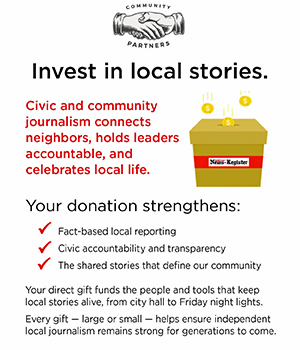Martin: Doing what we can for the planet
Thanks to my father and his dedication to environmental causes, I was taught as a young child that our earth is precious and we humans are responsible for its health.
As a Sierra Club leader, he led congressmen on wilderness tours to advocate for the preservation of Kentucky’s natural resources and oppose flooding those areas for boating recreation. And it worked.
My father challenged us to see ourselves as part of the natural world, with an ethical obligation to care for our planet.
He had me reading about John Muir, and followed Muir’s advocacy by taking us to every national park in the continental United States, all the while educating us about water, air and forest preservation. We also read Aldo Leopold and Rachel Carson.
We hiked, canoed, backpacked and camped, all the while following the Muir model of “taking nothing but pictures and leaving nothing but footprints.” We picked up all the litter we found and re-used or recycled all possible items.
When Dad took a sabbatical from the University of Kentucky, he chose to move us to Oregon State University in Corvallis for a year, due to Gov. Tom McCall’s successful efforts to balance economic growth with environmental protection by safeguarding Oregon’s beaches, rivers and farmland while curbing pollution and suburban sprawl.
Back in Kentucky, we followed Oregon’s progress with the Beach Bill, Bottle Bill and cleanup of polluted air and the Willamette River. We all vowed to return to Oregon to live among people who care about the environment and take action to protect our planet.
I have lived in Oregon since 1978.
I have been employed by the Youth Conservation Corps, teaching teenagers about air and water conservation, and supervising their work building trails and bridges, as they experience the joy of nature.
Settling into a career as a social worker, I’ve taken teens on wilderness trips and taught many to cross country ski.
I’ve worked for the Nature Conservancy on preservation projects. I donate to many environmental organizations, and am a 50-year member of the Sierra Club.
My husband and I bought our first all-electric car in 2014, a Think City two-seater, and followed with a hybrid in 2016. We installed 34 solar panels on our property this year, providing 100% of our electrical needs with power left over to be fed into the grid.
We do not buy items that are heavily packaged, so my kids never once got a snack pack, no matter how much they begged. We avoid purchase of small plastic bottles of water, continuing to refill old bottles instead.
We use a rechargeable electric lawn mower and yard tools. I make my own sparkling water drinks. We recycle everything Oregon allows and re-use many materials people often throw away, such as zip-lock bags.
I made 20 washable cloths and placed them by the paper towels, so we always think twice before using a paper towel. We cover serving bowls with washable shower caps rather than use plastic wrap.
We compost our food scraps. We have a large organic vegetable garden. We cook mostly seasonal foods that have not been shipped from afar. We grow our own chickens and eat eggs from our layers.
These are mostly small measures, but they add up.
I know I’m helping the planet. Thanks, Dad.













Comments